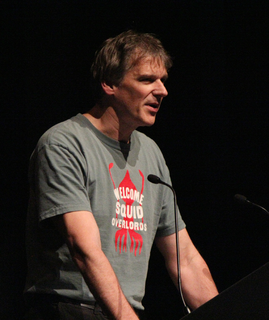A Quote by Francis Spufford
Despite the best efforts of apologists like William Lane Craig, the 'evidence' for Christianity's truth is, in truth, not the kind that science will or should ever admit. We believers mean something different by the word: something that puts faith permanently in the category of irreproducible results.
Related Quotes
I admit that my visions can never mean to other men as much as they do to me. I do not regret this. All I ask is that my results should convince seekers after truth that there is beyond doubt something worth while seeking, attainable by methods more or less like mine. I do not want to father a flock, to be the fetish of fools and fanatics, or the founder of a faith whose followers are content to echo my opinions. I want each man to cut his own way through the jungle.
Finding truth involves some kind of activity. As I like to point out, truth isn't handed to you on a platter. It's not something that you get at a cafeteria, where they just put it on your plate. It's a search, a quest, an investigation, a continual process of looking at and looking for evidence, trying to figure out what the evidence means.
Religion is based upon blind faith supported by no evidence. Science is based upon confidence that results from evidence - and that confidence can be modified and/or reversed by further observations and experimentation. Science approaches truth, closer and closer, by hard dedicated work. Religion already has it all decided, and it's in the book. It's dogma, unchangeable, and unaffected by reality and whatever facts we come upon in the real world.
There’s only one question that matters, Ms. Lane, and it’s the one you never get around to asking. People are capable of varying degrees of truth. The majority spend their entire lives fabricating an elaborate skein of lies, immersing themselves in the faith of bad faith, doing whatever it takes to feel safe. The person who truly lives has precious few moments of safety, learns to thrive in any kind of storm. It’s the truth you can stare down stone-cold that makes you what you are. Weak or strong. Live or die. Prove yourself. How much truth can you take, Ms. Lane?
Scientific truth is not what any one scientist puts forth. It can be that, but it is generally not. It is the sum of multiple studies that all lean in the same direction in their results conducted by different people at different times of different nationalities with different competitive urges who all end up getting the same result. Then you have an emerging scientific truth, and then you put that in the textbooks, and that will never be shown to be wrong later on.
Science is rooted in the will to truth. With the will to truth it stands or falls. Lower the standard even slightly and science becomes diseased at the core. Not only science, but man. The will to truth, pure and unadulterated, is among the essential conditions of his existence; if the standard is compromised he easily becomes a kind of tragic caricature of himself.
We may define "faith" as the firm belief in something for which there is no evidence. Where there is evidence, no one speaks of "faith." We do not speak of faith that two and two are four or that the earth is round. We only speak of faith when we wish to substitute emotion for evidence. The substitution of emotion for evidence is apt to lead to strife, since different groups, substitute different emotions.
Fiction can produce truth, and truth can be false. What does it mean to say that it's true that, what, two out of six people in this city are starving? That's true, but that is only true because the conditions we live under are completely wrong - that should not be true, and it is. And in something like Sarah Polley's film, her fictions deliver so much truth. The retellings and the simulations and the theatrical aspects are what deliver all the truth.
Truth is never our enemy, ever. So we should never freak out about people who claim to have discovered truth. If it's true truth, God owns it and has already accounted for it, and while nothing that is true ever contradicts God's revealed word in the Bible, discovered truth sometimes contradicts the words of Christians. We shouldn't be afraid of this, because God knew it before anybody else and its discovery is dependent on his sovereignty anyway. The truth is that the truth is ours - all truth is our truth because we are of Christ and Christ is of the sovereign God.
We don't know how large a proportion of the significant evidence about the universe is excluded by science. Perhaps hardly any. Perhaps so great a proportion that any body of knowledge which excludes it is hardly more than a caricature. Perhaps something in between - so that science finds truth but not the whole truth.



































